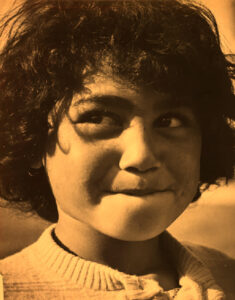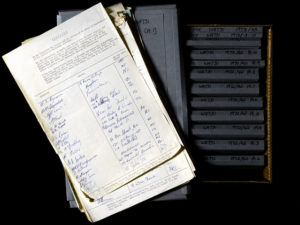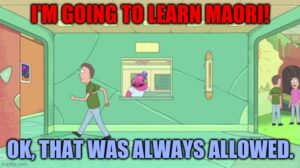1931: Policy of Adaptation
November 16, 2023
By AHNZ
 In 1931 the Policy of Adaptation was set down as Government policy whenever it came to Maori schooling and has remained so ever since. There were times before when a Policy of Integration was pursued became some legislators thought it best to provide young native minds with the same lessons as the Anglo New Zealanders and they did have a point about that. It was, after all, an ethic of equality to treat all races the same so that as adults nobody would be disadvantaged by having been treated differently. The most vociferous example we have in history of the Integration Policy came from Maoris themselves who petitioned The State to stamp out every word of Maori in schools entirely. Ref. 1876: Maoris Demand Extermination of Te Reo, AHNZ
In 1931 the Policy of Adaptation was set down as Government policy whenever it came to Maori schooling and has remained so ever since. There were times before when a Policy of Integration was pursued became some legislators thought it best to provide young native minds with the same lessons as the Anglo New Zealanders and they did have a point about that. It was, after all, an ethic of equality to treat all races the same so that as adults nobody would be disadvantaged by having been treated differently. The most vociferous example we have in history of the Integration Policy came from Maoris themselves who petitioned The State to stamp out every word of Maori in schools entirely. Ref. 1876: Maoris Demand Extermination of Te Reo, AHNZ
This policy was either created (or directly inherited) by the United-Reform Coalition of 1931 of which Robert Masters was Minister of Education.
It is a fact of history, then, that no living generation of New Zealander today ever had a school teacher who was directed to prohibit the speaking of Maori in their school. All the same, the myth persists. In reality the people of New Zealand and their Government desired and supported Maori kids “to further their knowledge of their culture” in the 1930s and beyond. Ref. Challenging the myths : rethinking New Zealand’s educational history by Roger Openshaw (1993)
Urban Legends about Maori children being told off or assaulted in school persist because Left Wingers and Grifters keep perpetuating them for their own self-interests. For example, Christchurch Communist Elsie Locke wrote to the Press in 1980 to quote a 1955 article from the Polynesian Journal: “For many years head teachers had been instructed to discourage the use of Maori in the school environment. In certain schools…” Based on the selective passage Locke quoted it looked as if she was right about discrimination against the Maoris. But here is the full passage…
“For many years head teachers have been instructed to discourage the use of Maori (language) in the school environment. In certain schools, fortunately a minority, this resulted in a firmly enforced ban,” – The Maori School—A Cultural Dynamic?, Guy Powell, Journal of the Polynesian Society (1955)
Locke evidently lifted the part of the quote that suited her point of view and ended it before the words indicating this was “a minority.” She probably took her quote from the text of The education of Maoris in New Zealand by W. Parsonage (1956.) She quotes him as saying “There was such a ban prior to 1930, but since that date there has been no official prohibition.” Ref. Press (1980,) Papers Past
Parsonage made it quite clear that Powell’s observation was “a generalisation, based on an admitted single instance, which may completely misrepresent the real situation.” His full quote is that “There was such a ban on the use of the Maori language prior to 1930, but since that date there has been no such official prohibition. On the contrary, where there have been teachers qualified to teach the Maori language, such teaching has been permitted, whilst the use of the Maori language by the pupils in the playground is still quite common. I have been present in various schools when the pupils have produced plays, held simple debates and delivered historical lecturettes in the Maori tongue. In infant rooms one of the most delightful experiences is to witness the zest with which the young Maori children will sing nursery rhymes in Maori, or perform action songs and haka.” Elsie Locke did not tell the Press about that bit. Ref. JPS (1956,) Auckland University
 The Te Reo Maori Claim of 1972 stirred up Maoris holding Government responsible for how well their culture was doing too. This time it wasn’t a call to ban the Maori language from schools but to insert it! Of course this petition is part of the nation’s “sacred taonga” treasure alongside The Treaty of Waitangi and the Woman’s Suffrage Petition. The 1876 Petition is just as importantly historically but we wont be talking about that; It’s politically incorrect. Ref. 1972: Te Reo Maori Claim, AHNZ
The Te Reo Maori Claim of 1972 stirred up Maoris holding Government responsible for how well their culture was doing too. This time it wasn’t a call to ban the Maori language from schools but to insert it! Of course this petition is part of the nation’s “sacred taonga” treasure alongside The Treaty of Waitangi and the Woman’s Suffrage Petition. The 1876 Petition is just as importantly historically but we wont be talking about that; It’s politically incorrect. Ref. 1972: Te Reo Maori Claim, AHNZ
Nor will we look too hard at the 30,000 signatures on the 1972 petition. According to Archives New Zealand some of the contents are not authentic or perhaps a big joke. Some signatories say they live in the shop the page was offered in, another says “Washington” in the USA. There are some burn marks and an explanation “Burning due to fire initiated by right-wing arsonist”. Ref. Archives NZ, AHNZ, Facebook (2022)
 During this time Kura Thorsen changed her surname to Maori as other women artists were doing at the time and told the Press that Maori “has survived a century despite deliberate suppression.” As Te Waru-Rewiri she offered to explain why the Baby Boomer Maoris were not speaking their language. “Maori parents felt it would not be beneficial to their children, so did not teach or speak the language in their presence,” she said. Also, “The young people are the only ones who are doing anything about it because I suppose we are the ones who want it most.”
During this time Kura Thorsen changed her surname to Maori as other women artists were doing at the time and told the Press that Maori “has survived a century despite deliberate suppression.” As Te Waru-Rewiri she offered to explain why the Baby Boomer Maoris were not speaking their language. “Maori parents felt it would not be beneficial to their children, so did not teach or speak the language in their presence,” she said. Also, “The young people are the only ones who are doing anything about it because I suppose we are the ones who want it most.”“In 1931 a policy of adaptation (later referred to as integration) was incorporated into Māori schooling and sought to encourage Māori pupils attending ‘native schools’ to further their knowledge of their culture (Openshaw et al., 1993, p. 60). ” – 1931 – New Maori education policy of adaptation introduced, History of education in New Zealand, McGuinness Institute (2016)
“There should not be a word of Maori allowed to be spoken in the school, and the master, his wife and children should be persons altogether ignorant of the Maori language. “ – Petition from Wi Te Hakiro and 336 Others to The House of Representatives, 1876: Maoris Demand Extermination of Te Reo, AHNZ
“Since the middle of last century N.Z. educators have carried on a total war on the Maori language as part of the total war on Maori Identity. This has been a process of assimilation, euphemistically labelled ‘integration’, a process of murdering people by suppressing their culture, while robbing them of their land and wealth and reducing them to the semi-slavery of the unskilled labour pool, with the status of Honorary White Dropouts. If we take the more kindly view, that the suppression of Maori was not aimed to be cultural genocide but rather an aid to the ‘civilisation’ of the Maori people, we can only conclude that with 92.5% of the Maori labour force in 1966 (census figure) having no educational qualifications this approach has been catastrophic in its failure. This state of affairs calls for a complete change in education policy.” – A Van der Schaaf, Maori Language pamphlet; published by the Te Reo Maori Society in 1970
Another of the aggrieved Lefties made the above statement which is perhaps should win the award for the Oppression Olympics in this category. Arjen Van der Schaaft was a Canterbury University graduate, student politician, and trade union delegate. Even though his complexion and name screams “Dutch” he apparently felt the need to be White Savior or at least to score some of those Victimhood Culture points by banging on about Maori language oppression. Calling it a “total war on the Maori language” and “murdering people” he went on to refer to a “genocide” long before Tariana Turia famously did so in 2000. Ref. Saliant (1970,) Victoria.ac
The Policy of Adaptation in 1931 was a radical change that history probably owes to Robert Masters but the fact gets in the way of a good resentment story and tens of millions of dollars. We can’t have that.
—
Image ref. Ans Westra (1960s,) Museum of New Zealand. AHNZ shading
Note: When The State centralises our lives, our language, our dialects, inevitably one dialect achieves prestige over others. Linguistic hegemony. The language of the rich, the elite, the aristocrats. The privileged Maori dialect is Nga Puhi. It’s the one taught by State schools and hypercharged with the steroids of government favor and funding. For all other Maori kids speaking their language at home and at school there will be reprimands from teachers for not using the “correct” pronunciation and grammar of the prestige dialect. Ref. p122, Jack Richards in Introduction to Maori Education (1970)
 Like Comment Share
Like Comment Share





